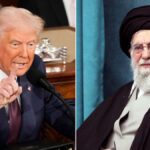
Germany Considers Banning the Burqa
As Germany prepares for pivotal state elections, interior minister Thomas de Maiziere has suggested banning the full-face burqa worn by some Muslim women.
The nation has erupted into a fierce debate on “integration” as it struggles to accommodate more than 1 million refugees and migrants – most of them from predominantly Muslim countries. The minister, one of Chancellor Merkel’s closes allies, explains that the burqa simply “does not belong in our cosmopolitan country;” it is “not a security issue but an integration issue.”
The ban is a “preventive measure,” he continues, adding that the full-face veil is not a common sight in Germany.
A bill has yet to be introduced, but De Maiziere explains that the ban would only apply in “places where it is necessary for our society’s coexistence,” such as schools, government offices, and courtrooms. The blanket ban favored by Angela Merkel’s hard right Christian Union bloc, he points out, would be far less likely to win approval in parliament.
“From my point of view,” says Merkel,” a woman who is entirely veiled has hardly any chance at integrating.”
Germany isn’t the first nation to oppose the idea of full-face veils. In April 2011, France became the first country to ban the burqa and the niqab. Any woman caught wearing a veil in public, as well as any person attempting to force a woman to wear a veil, risks a hefty fine and up to 1 year in prison. Belgium passed a similar ban in July 2011. Chad banned women from wearing the burqa following two bombings in June 2015.
Other countries have banned face veils in places like hospitals, while some leave the decision to individual schools and government offices.
Turkish-born integration expert Bilkey Oney believes that Germany would gain nothing by banning the burqa: “In France they long ago outlawed the burqa, but it apparently couldn’t stop a single terror attack. However, I don’t like the mentality behind a burqa either – it is a piece of clothing that no emancipated woman can accept.”
Oney believes that instead of focusing on clothing, Germany should work to expand its integration efforts. “You have to convince people to no longer want (the burqa). We must ensure that Muslims and migrants emancipate themselves, but that will take time.”
De Maiziere’s suggested ban is a compromise between hardliners as Germany prepares for two critical regional polls in which the right-wing populist Alternative for Germany (AfD) party is poised to make strong gains.
The AfD has attempted to make a connection between the record number of refugees and migrants Germany has accepted over the past two years and the increased threat of terrorism – a stance Chancellor Merkel simply will not accept. “The phenomenon of Islamist terrorism by ISIS is not something that came to us with the refugees,” she said. “It was already there.”
The idea to ban the burqa was introduced on August 11th as De Maiziere revealed strict new anti-terror measures in the wake of two attacks last month (both have been claimed by ISIS). The new measures include a proposal to strip jihadist fighters of their German citizenship and changes to the deportation process that would expedite the removal of convicted migrants.
Editor’s note: This would treat one of the symptoms, but not the real probem which is that radical Islam is not compatible with freedom and democracy.

























Larry, As per usual you are living in a bit of dream world, and yes Schumer is right to target…
Tempest in a tea pot, Mountain out of a mole hill. Why do the right wing trouble makers pick minor…
When a tree falls in the forest and nobody hears it, does it make a noise? Maybe that's what this…
Seth. Intelligent debate tactics from your comments. Strictly sticking to the pertinent facts argument points raised by Larry is a…
At last Larry has been heard from with "Leave a Reply". We know Larry is the author of the Reply…